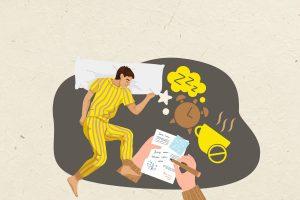Does Sleep Journaling Help You Sleep Better?
May 19, 2025 | Written by SleepyCat Team

Hey, you. It is me, Zie–back again with an awesome sleep hack. Were you ever that kid who found solace in writing about your day? The kind who made sense of their emotions by putting pen to paper? That has always been my way too. But sadly, we grew up and our worlds slowly drifted into a digital space, and we got lost in translation somewhere along the way. Lately, though, a meaningful trend has been making its way back into our lives: Sleep Journaling.
In a culture that glorifies over-productivity and overstimulation, sleep has been deemed a luxury. This perception is not only flawed; it’s detrimental to our physical and mental health (source). Think of sleep journaling as your nightly wind-down with purpose: no gimmicks, just a cute little notebook (or your preferred wellness app) and a few mindful minutes. It is an analog self-care in a digital age.
A sleep journal helps you track when you go to bed, how well you sleep, how long it takes to fall asleep, and what factors–like stress, screen time, or caffeine–might be affecting your rest. It is still about putting your thoughts down, but now, with the gentle intention of sleeping better.
I have started doing it, and I totally swear by it. That is why I am sharing this hack with you, not as a trend to follow, but to build habits that endorse better sleep. A few quiet moments of reflection could lead to deeper sleep, rejuvenated mornings, and a calmer mind.
1. Understand Your Sleep Patterns
Ac cording to a study published by the National Library of Medicine, maintaining a consensus sleep diary has helped people with insomnia sleep better (source). A sleep journal is not just mundane tracking. It is self-awareness in motion. It helps you understand your sleep patterns. You might think you are getting enough rest, but the numbers can tell a different story. By recording what time you go to bed, how long it takes to fall asleep, how many times you wake up, and how you feel in the morning, you can begin to spot patterns. Maybe you assume you are getting eight hours, but a journal reveals you are just tossing and turning for two of those. Once you understand your sleep habits, you can begin to make informed, meaningful changes.
Many reputable organizations have designed downloadable templates to keep track of your sleep patterns. Some of them include: National Heart Lung and Blood Institute (source), National Sleep Foundation (source), Government of Western Australia Department of Health(source), and the American Academy of Sleep Medicine (Source).
2. Caffeine Is Not Your Friend; It Is Your Sleep Disruptor

That third cup of latte at 6 p.m.? It might be the silent saboteur of restorative rest. Caffeine can completely affect your slow-wave sleep, a crucial phase for your well-being. Slow-wave sleep, the third stage of rest, is when electrical activity in the brain changes while your body enters a deep, restorative slumber(source). During this phase, breathing becomes slow and steady, and muscles relax completely. It is also when vital hormones are produced. However, caffeine blocks adenosine receptors in the brain, disrupting your slow-wave rest. Caffeine tampers with the body’s natural rise in sleepiness, leading to a reduced understanding of sleep debt.
Through sleep-journaling, you can log caffeine intake, alcohol, screen time, exercise, and even late-night snacking to understand how these behaviors impact your sleep. Sleep journals help you connect the dots between your daytime habits and your nighttime rest, encouraging you to eliminate what is working against you.
3. Manage Stress Through Sleep Journaling

According toIKEA’s Sleep Report 2025 (source), 70% of Indians believe they are well-rested. When you scratch the surface, 48% admit that stress is a major sleep disruptor, and nearly 60% sleep less than six hours a night due to stress. I know, because I have been one of them. For the longest time, I’d lay in bed with a thousand thoughts running through my head–conversations I should have had, comebacks I wish I thought of faster, things I did not finish, that one black top I bought 2 years ago and tomorrow’s list looming large before the day even ended.
That is when I started sleep journaling. It is a simple act, really. Sometimes it is a list, sometimes a rant, sometimes just one word. But it helps. I get to unload the mental weight, clear the clutter, and make space for silence and comfort. Over time, I started falling asleep faster and woke up feeling a little more composed. Sleep journaling gave me a way to pause, process, and rest. And if your nights feel as noisy as mine once did, maybe it can help you too.
4. Create a Better Sleep Routine

With sleep-journaling, you are more likely to become consistent with your bedtime routine. By tracking what genuinely helps–like reading a few pages of a book, dimming the lights, or meditating–and what does not (say, checking emails or scrolling social media), you begin to shape a ritual that supports sleep rather than disrupts it.
Also read –How Quality Sleep Can Improve Athletic Performance and Recovery
To create a better sleep routine, you must first understand what kind of sleeper you are. According toIKEA’s Sleep Report 2025, sleep is deeply personal, and every person has their own habits. About 14% of Indians identify as bed-hoggers, 48% say they just cannot sleep alone, while 8% prefer having the bed to themselves. For about 32%, music is the key, and 24% Indians, wind down with a book. Around 23% credit high-quality mattresses and pillows for a good night’s sleep, and 16% cannot rest unless their room is completely dark. Once you have identified your sleep personality, you can create your own bedtime routine.
Sleep journaling helps you figure out your own “sleep signature”. The unique cues, comforts, and conditions that let your body and mind settle into rest. When you know what works for you, you can build an environment where your sleep naturally thrives.
Sleep journaling is not complicated. It is just you, and a few honest lines before bed. It helps you understand your body, your habits, and what rest really feels like for you. I have started doing it, hoping to sleep better, but ended up knowing myself better, too. And if it has helped me, maybe it can help you too. Whether you are aiming for those golden 7–9 hours of sleep, cutting down on midnight wakeups, reducing screen time in bed like your fellow 86% Indians, or just waking up to catch up on a quick walk, seeing your progress (or setbacks) will definitely keep you motivated.
Featured Products
Cloud Pillow
Get the luxury and comfort of a hotel pillow at home. This is supersoft, lighweight and has a smart zipper for adjusting its firmness.
Cloud Pillow
Get the luxury and comfort of a hotel pillow at home. This is supersoft, lighweight and has a smart zipper for adjusting its firmness.
200 TC Percale Fitted Bedsheet Set
Make your bed within minutes, thanks to elastic corners which make it super easy to tuck perfectly!
300 TC Sateen Pillow Cases
Combining the buttery smoothness of sateen fabric with a refined, seamless design, these pillow covers offer a luxurious look free from visible zippers or buttons.
